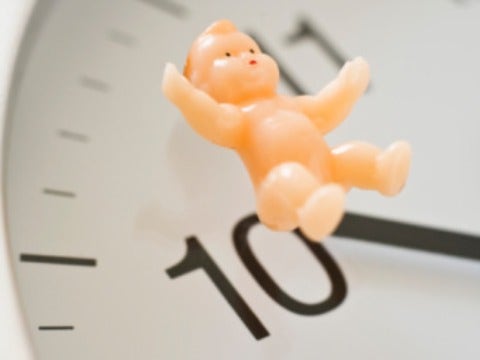Most Women Flunk "Fertility Math": Do You Know Your Chances?
My pregnancy chances may not be high when I'm older, but I'd rather take them than make a mistake.

I remember the day my 31-year-old friend told me she was not only going to start online dating, but she was seriously considering freezing her eggs, too. I was 27 at the time, when over brunch that day she informed me that after 30 fertility drops "significantly." She never gave me exact percentages, but she had become so convinced she was biologically screwed, she started doing everything she could to beat the clock that was loudly ticking in her ear and make sure her chances at motherhood would eventually be realized. She was married a little over a year later, but had yet to find the funds necessary to freeze her eggs. Now, at 38, she still doesn't have a baby, because the husband she so desperately wanted isn't ready to be a dad. So much for that.
We live in a world where women conceiving older and older is becoming the norm. Salma Hayek had a baby girl at 41 and Holly Hunter had twin boys at 47 years old — a trend that is giving women in their 30s who have put having children off a sigh of relief. However, a recent study shows that women do not truly understand just how slippery the fertility slope really is.
A recent poll conducted by RESOLVE, the National Infertility Association, of 1,000 women between the ages of 25 and 35 proved that this is true — women are indeed misinformed on the matter. Most women have no idea just how much fertility decreases at certain ages. Whereas a healthy 30-year-old has a 20-percent chance of conception if she has unprotected sex for a month (i.e., "tries"), that percentage drops to only five percent by age 40. Poll participants, however, thought that those percentages were 70 and 60, respectively. Even a 20-year-old woman can only get pregnant in, on average, five months of unprotected sex.
Personally, this shocks me too. In fact, I had no idea that for a 30-year-old the percentage was so low. As someone who has never witnessed any friends having any sort of complications in getting pregnant, it has always seemed to me that it was far easier to get pregnant than to avoid it. In some ways, I'm happy to have come across these facts, but at the same time, it scares me a bit.
Despite this new knowledge, at 34, I have zero plans to run out and start having babies. I am neither financially nor emotionally ready to take on such a huge responsibility. I feel that to have a child now would be selfish, but I also feel that to have a child at 45 is selfish, as that baby probably won't get to have you around as long as either one of you would like. So what does one do? I don't have the answers for this one. All I can say is, I'll toss the cards in the air and see where they fall — let's just hope most of them land on the table.
Do the results of this fertility study surprise you?

